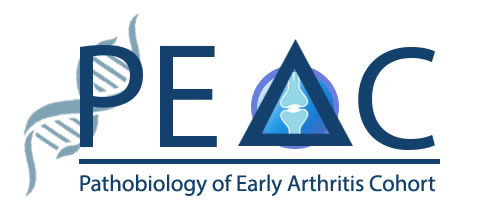



The Pathobiology of Early Arthritis Cohort (PEAC) has been established through the contribution of a consortium of independent, national centres of excellence. The aim of this project was to create an extensively phenotyped cohort of patients with early inflammatory arthritis linked to detailed pathobiological data.
Having recruited more than 350 patients with early inflammatory arthritis, PEAC has become an internationally renowned landmark for translational and clinical research in inflammatory arthritis, leading to enormous scientific and clinical advancements, such as the description of specific patterns of synovial inflammation (pathotypes) associated with disease outcomes and response to treatment. PEAC paved the road for precision medicine trials in inflammatory arthritis, which are contributing to the change from the current approach to diagnosis and treatment, based mainly on clinical features, historical licensing and health economics to a more precise diagnosis and to a rational, pathway-driven treatment approach based on molecular pathology, with the ultimate aim of implementing patient-centric precision medicine in inflammatory arthritis.
Building on the success of PEAC, we recently introduced the Pathobiology of Established Arthritis Cohort (PEsAC), an extension of the study that will enable to recruit patients at different stages of disease progression and treatment exposure, with the aim to study additional mechanisms of disease evolution and treatment response/non-response, including for example the study of difficult-to-treat patients, i.e. patients who failed multiple targeted medications.
Number of recruits: 350+
Number of sites open: 1